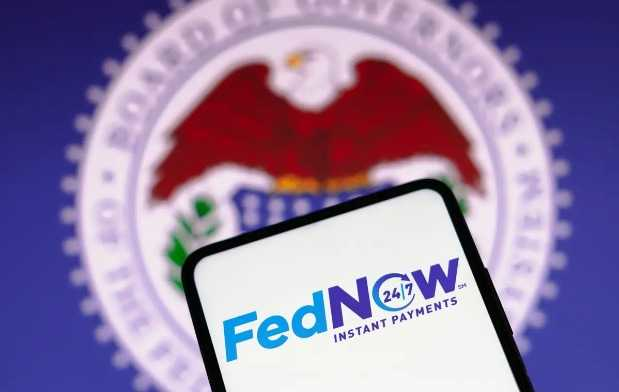FedNow will be the first of its kind central bank instant payment system in the US and could revolutionize how businesses and consumers pay and receive money. But not everyone is prepared for it.
After a pilot program that lasted six months, the US Federal Reserve System plans to launch its FedNow real-time payment system in July. But many banks and businesses could be caught flatfooted when it launches.
The central bank’s payment and settlement rail is designed to increase liquidity, especially for small businesses and supply chain participants who can get paid instantly for goods and services. It also creates a new way for employees, especially gig and hourly-rate employees, to get paid more quickly and frequently — perhaps every day.
The new system will allow banks, businesses, and consumers to send and receive payments in about 10 seconds anytime, any day. As with other payment systems, there are fees associated with the service, and banks will have to decide who foots the bill — merchants, consumers, neither, or both.
"Banks aren't 24/7 in their operations today," said Debbie Buckland, a director analyst in financial services for Gartner Research. "So, they'll have to have procedures set up to accomodate that liquidity management that happens in the middle of the night. Becasue if you give your customers the ability to do their banking in the middle of the night, they're going to do it."
Initally, FedNow will only let banks receive payments; the ability to send payments — and for consumers to be able to identify themselves by phone number and email only, as Venmo now allows — is expected to come later.
"The send part takes a little more work," Buckland said. "You have to have a vehicle for customers — both consumers and businesses — to initiate a real-time payment. That means adding that functionality to their digital and mobile channels. You need to be able to upgrade your product or turn on that service."
For consumers, the process is far easier. Those who want an instantaneous way to make payments, whether it's for a retail product or a mortgage installment, will need to download an app once their financial services provider offers it.
There are two primary differences between FedNow and traditional payment systems such as automated clearinghouse services (ACH) and wire transfers, such as Western Union or the Fed’s own Fedwire service. ACH transactions settle just once at the end of a business day, and they settle in batches — not individually. Wire transfers are faster, but charge higher user fees. Wires are also not used for multiple or traditional batch transactions, and they’re still not real time; they can take several minutes or several days for remittances or cross-border payments.
For consumers not familiar with the ACH payment system, it's the funds transfer system used when employees sign up for direct deposit, make eChecks payments or authorize automatic payments to be deducted from their banking accounts.
FedNow is not a replacement for existing ACH and wire networks, but an additional payment option when real-time payments and settlements are needed.
Existing payment systems will be challenged by FedNow’s efficiency, and while the impact will be significant, it’s not likely to supplant other systems, according to Aaron Press, research director for Worldwide Payment Strategies at IDC.
“Electronic payments are growing fast enough in general that, even if other systems lose share, they won’t necessarily stop growing,” Press said. “But, they’re not taking this standing still. Every other payment system [operator] is thinking about how to position against FedNow. Even the [Federal Reserve] is thinking about the impact of FedNow on its own Fedwire service.”
The new system also means banks that adopt it will have to adjust to a 24/7 world where merchants or consumers might want to transfer funds between different third-party accounts at odd hours of the day or night. It also means banks won’t have a full business day, as they do now, to go through know-your-customer, anti-money laundering, and anti-fraud processes. Those processes will have to be automated for real-time discovery.
For many banks, 'a real shift'
“For a lot of banks, this is a real shift in operational thinking,” Press said. “The margin of error is significantly smaller. The time to do things manually is essentially gone. We’re hearing a lot from banks and vendors who offer automation that there’s an increasing demand for automating a lot of tasks and workflows to better handle real-time messages.”
From a corporate standpoint, the use of FedNow is not just about being able to pay faster; it can be about paying slower or determining the last possible moment a payment must go out. For businesses that pay millions of dollars day in and out, holding onto money until it must be paid can amount to earnings.
“If you have an invoice with advantageous terms to pay at a certain time, you want to submit at last possible moment,” Press said. “FedNow gives you a lot of control over when precisely you pay. If those same invoices are paid over ACH, there’s some uncertainty to that.”
Retail merchants and others who want to offer consumers an instant-payment option will have to work with their payment providers, such as FIS, Fiserv, Jack Henry and Q2 to ensure the point-of-sales (POS) system has the proper APIs and ensure their systems are properly connected.
The FedNow instant-payment system will use the new ISO 20022 global financial messaging standard, meaning banks will need to be sure they can submit messages in that format. Many banks may already have the ability to submit messages through ISO 20022, because FedNow is actually the second real-time payment system.
In 2017, a consortium of banks called The Clearing House launched the Realtime Payments network or TCH RTP. But the network failed to achieve wide adoption because smaller banks were wary of using a payment system backed by their larger competitors. However, TCH RTP does use the ISO 20022 standard.
At its core, FedNow serves as an interbank instant-payment infrastructure. Banks, credit unions, and other eligible institutions have accounts at the Federal Reserve that allow them to hold reserves. Banks pay each other by transferring reserves from the paying bank’s Fed account to the receiving bank’s Fed account using several interbank payment options. FedNow is a new addition to the suite of options to make such transfers.
Sam Aarons, co-founder and CTO of middleware payments provider Modern Treasury, said the payments industry is excited about the promise of FedNow. Modern Treasury provides the translation layer for corporate accounting systems to transfer funds over a network using API calls systems. Bank systems are sorely outdated, however, and still rely on technology from the 1970s and 1980s.
"That’s also why Modern Treasury is excited about FedNow, because it is going to force a lot of people into figuring out what is a modern technology stack for payments," Aarons said. "As I like to say, what is a business day if money can arrive and leave your bank account 24/7, 365 [days a year]? Are you going to have accountants stay up at midnight to close the books? You need to change the software for your company that’s looking at the precipice of that."
While integration with FedNow is one issue, moving payment systems to be real-time is the bigger problem, according to Aarons.
"Where we usually see the hiccups is in fraud checking and [Know Your Customer]," he said. "A lot of those systems throw up a red flag when there's a questionable transaction, and then you have a day and a human can look at this payment. When you’re trying to send out payments in 10 seconds, you have to automate that or make your decision quickly. 'Yes, I can send this out,' or 'No, I can’t send this out.'"
A gig worker’s dream
One advantage to using FedNow is that organizations who employ gig or hourly workers can pay them at the end of a shift because the money transfers instantaneously. Today, when a gig worker is paid, it’s through a credited system and the actual money doesn’t transfer from bank to merchant until the next day. Gig workers, however, will need a bank account to be paid, versus a payroll debit card as many use today.
The United States is a follower in rolling out a central bank-based instant payment system. Forty to 50 other countries have already implemented same-day payment systems — and their uptake was fast, quickly reaching nearly ubiquitous use.
For example, Brazil’s Central Bank launched the Pix instant payment system in 2020; within a year, it had reached more than 100 million users and today it serves more than 150 million people. That suggests FedNow will be quickly adopted across banking and business sectors.
There’s a good reason for the quick uptake. When businesses are making thousands of payments a day to distributors and suppliers, it behooves everyone to get their money faster. Like Brazil's Pix, FedNow will allow companies to pay vendors, contractors, or any business partner instantly. And it will enable better cash-flow management because funds are instantly available, allowing for faster reinvestment.
Because most US companies now use the ACH system to make and receive payments, they experience next-day clearing for batch transfers, or they pay extraordinarily high fees for faster wire transfers.
"FedNow represents huge advances for the businesses of today that are moving money around," Aarons said. “FedNow is an opportunity to deliver a great consumer experience, but also one for banks as well. It’s a really good opportunity for the US to catch up with the rest of the world.
"I think there's going to be a big lift-off when FedNow launches, and the hope is to get to universal coverage that we have with ACH and wire," Aarons said.











 All while Pfizer—a company with a $2.3 billion criminal fine for fraudulent marketing, bribery, and kickbacks—was given blanket immunity from liability and billions in taxpayer dollars to produce a vaccine in record time with no long-term safety data.
All while Pfizer—a company with a $2.3 billion criminal fine for fraudulent marketing, bribery, and kickbacks—was given blanket immunity from liability and billions in taxpayer dollars to produce a vaccine in record time with no long-term safety data.
























